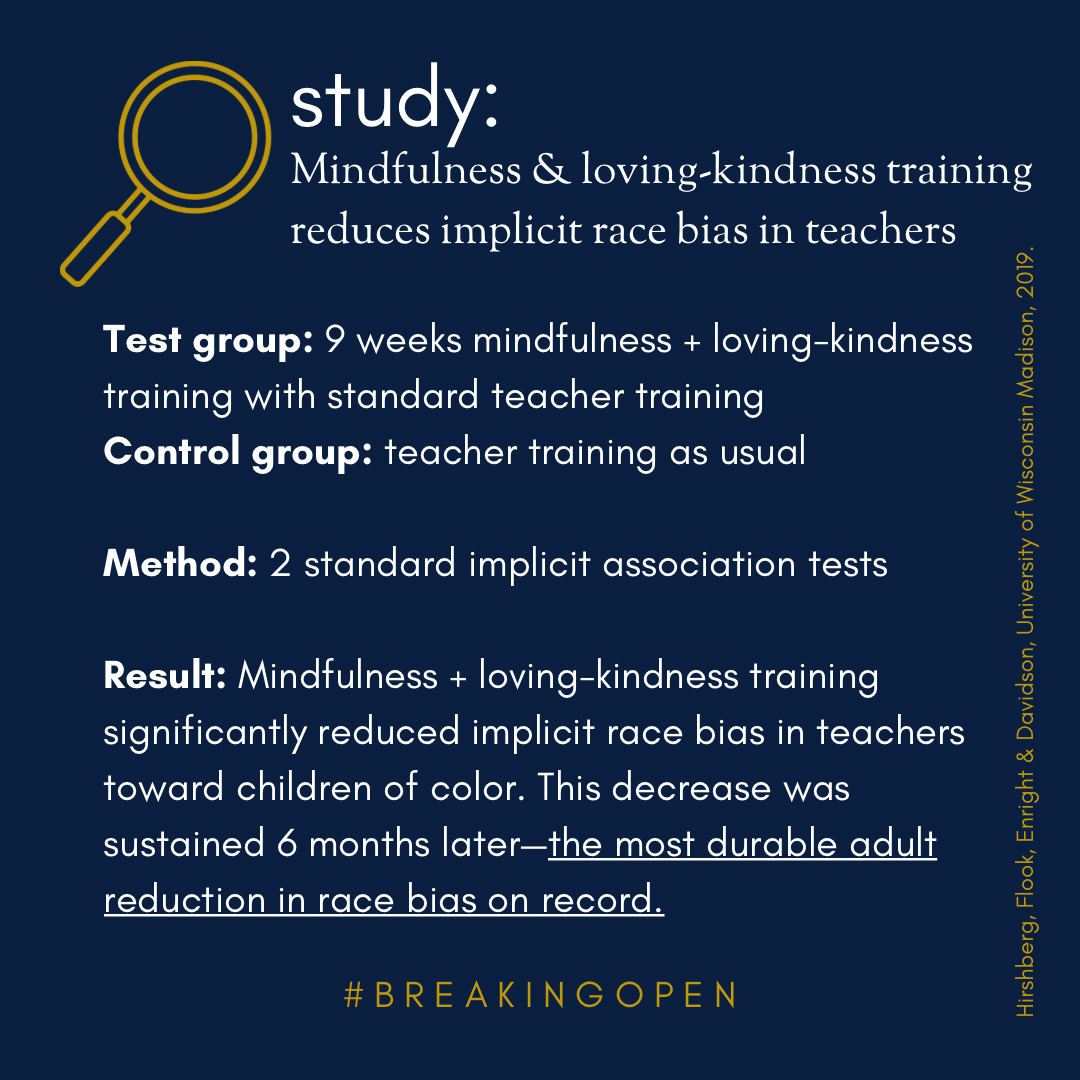Research on mindfulness practice is a still-young but rapidly growing field. You may have already seen reports that mindfulness positively impacts mental and physical health, improves interpersonal relationships and elevates the performance of leaders and teams.
Without a doubt, though, the research I am most excited about is on the relationship of mindful awareness practices to our anti-racism work. This research reflects the experiences shared by hundreds of students I have taught over the years, who have observed:
Increases in…
Awareness of self and others
Empathy, connection and compassion (for self and others)
Ability to tolerate difficult emotions—a key skill in navigating the shame, guilt and other feelings that arise as we confront our unconscious biases
Reductions in…
Automatic thoughts and behaviors, resulting in less reactive decisions, words and actions
Rigidity or clinging to one particular story of how things are/should be
Biases, prejudices and judgments (of self and others)
Really? Really.
I’m delighted to share three of my favorite studies (including the most durable reduction of adult race bias recorded to date!) paired with perspectives on mindfulness as a key element of our anti-racism work from several of our greatest living teachers.
Note: Each of these quotes comes from Rhonda V. Magee’s excellent book The Inner Work of Racial Justice, which belongs on every anti-racist reading list. I highly recommend it, especially as an audiobook, given Magee’s guided practices work well in that format.
First, what is mindfulness anyway?
Here is Magee making the case for the role of mindfulness in understanding race and identity:
Remember Pavlov and his dogs, who salivated when they heard a bell that they had learned to associate with mealtime? That’s an example of classical conditioning, or learned responses. All of our biases are learned responses; we are not born with racist beliefs and assumptions, they are taught to us.
This study found that six sessions of training in mindfulness practice (not coincidentally the same duration as our Breaking Open courses) significantly reduced conditioned behavior responses, in other words disabled the participants’ automatic pilot:
Let’s remember we are wired for bias. It is a neurological and evolutionary shortcut that needs to be monitored and mitigated. Or, as Reverend Angel Kyodo Williams says:
In this study, teachers in training were offered nine weeks of mindfulness and loving-kindness practice instruction, resulting in the most lasting reduction of adult race bias on record:
Imagine the impact of those results on the quality of attention, support and education those teachers’ students will enjoy and you might imagine, as I do, that one day this training will be a mandatory requirement of everyone in education. And healthcare… And government… And business…
This is what we want in our leaders. As Thich Nhat Hanh says:
My favorite study of the last 10 years is this one, which compares loving-kindness practice (a key tool we introduce in Breaking Open) to loving-kindness discussion. In other words, the practical, hands-on application of kindness vs. a merely intellectual or conceptual understanding of it. Guess which one wins:
It’s important to note that explicit bias did not shift in any group. Everyone (including the wait list group) started and concluded the study saying the same things about Black people and homeless people. But only the practice group saw a significant reduction in implicit bias—and it was quite significant. The discussion group’s implicit bias shift was only marginal and closer to the wait list group, who received no intervention whatsoever.
I’ll close with this challenge from Larry Yang, a leader in bringing mindfulness out of the too-often white and upper-class circles where it has gained prominence in the West, and increasing access across all communities, particularly those that have been marginalized:
Where is your moment-to-moment practice of integrity?
If you are looking to start one, I invite you to join Breaking Open. All proceeds benefit The Loveland Foundation, supporting mental health services for Black women and girls, and the AAPI Community Fund, providing increased support to Asian American and Pacific Islanders amid the increased attacks that community is facing.
I want to:
Tell people about Breaking Open
Registration closes on April 4. The course begins on April 10. I hope you’ll join us.
Share this post on Instagram:












